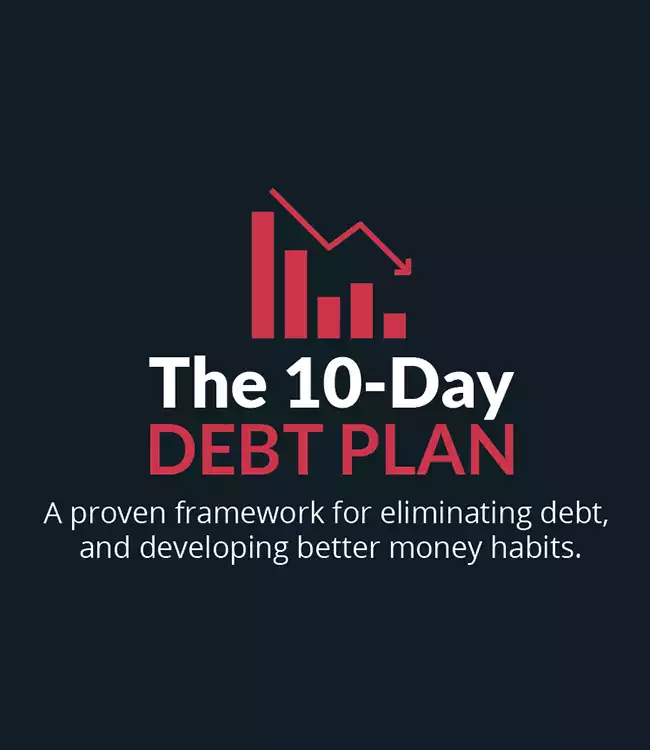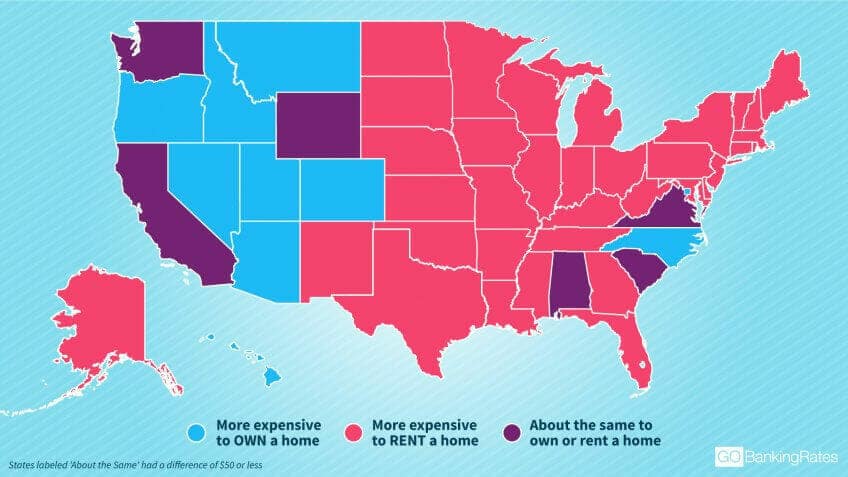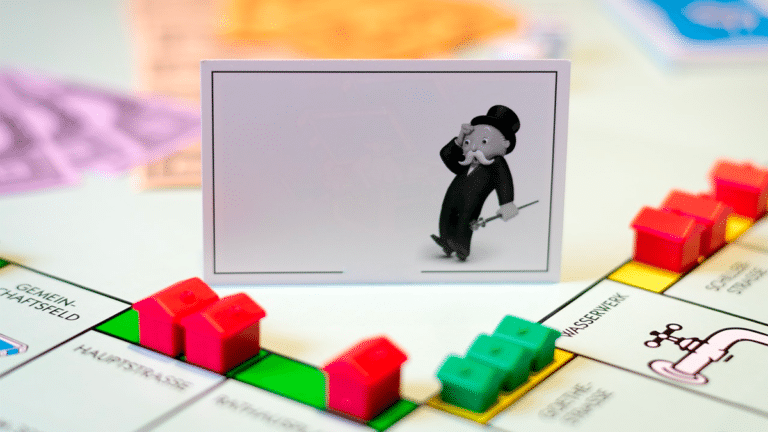- Is Renting Better Than Buying
- Monthly Rent Costs You More
- It’s the Principal
- How Does Escrow Work?
- Keep it Flowing
- Opportunity Costs
- Tax Benefits
- Flexibility
- Price-to-Rent Ratio
- Why You Should Rent Instead of Buy
- Your Net Worth
- Location Location Location
- It’s Not Always About Money
- Bottom Line
- Show Notes
We’ve all heard the cliché that if you’re renting, you’re wasting your money. But is that true? Rent vs buy, it’s one of the most important financial decisions you’ll make.
Is Renting Better Than Buying
Homeownership used to be a hallmark of the American dream achieved. It showed that you were an adult and that you had “made it.” But that is no longer the case for many young people. Lots of them have decided it’s better to rent than buy.
Earlier this year, US homeownership rates fell to a 48 year low. For those under age 35, the rate of ownership is just 34.1%. That is about half the rate of overall homeownership in the US.
Millennials either didn’t get the memo outlining the American dream, or they disagree for various reasons that renting means throwing your money away.
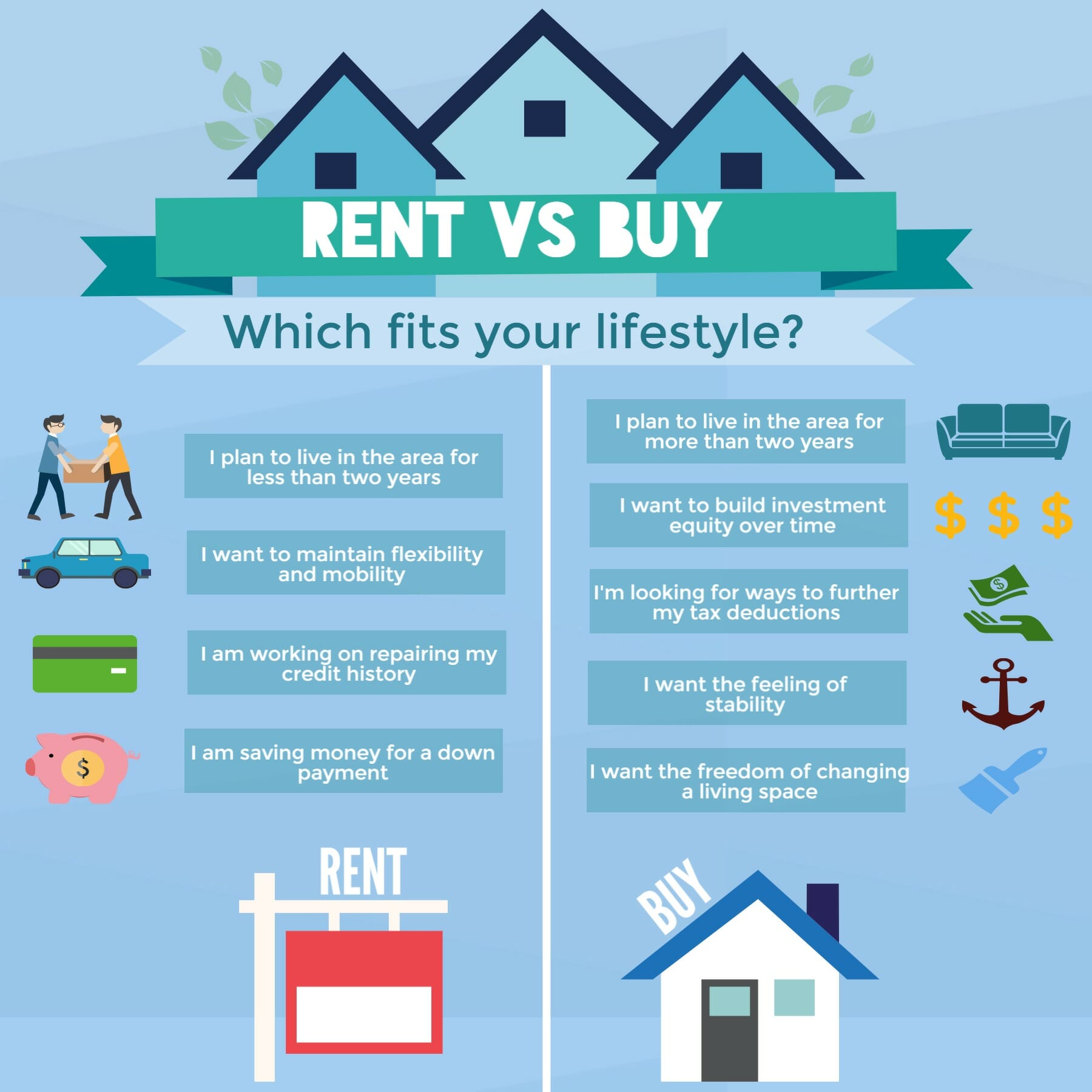
Monthly Rent Costs You More
This is a big reason many people give when they advocate that you buy rather than rent. One day (maybe), you will pay off your mortgage and own your home outright. And that’s true. But that doesn’t mean that magically your home stops costing you money the day the mortgage is paid off.
You still have to pay things like property taxes, maintenance, and repairs. Which your home will need more of the older it gets. None of those things are your problems or your expenses when you rent.
This free course outlines a proven framework that thousands of people have used to eliminate their debt, develop better money habits, and start building a secure financial future.
It’s the Principal
Your mortgage payment is made up of more than the principal. Your monthly payment includes interest. The bank didn’t lend you that money out of generosity.
In the beginning, the vast majority of your monthly mortgage payment is going toward paying that interest.
Here’s an example:
If you have a $200,000 thirty-year fixed mortgage rate of 4.5%, your payment will be $1,014 per month.
Of that, the first payment you make will see $750 go toward interest and just $264 to pay down the principal.
After twenty years, the payments will be more heavily tilted toward principal with $647 paying it down and the remaining $367 going to interest.
There are other things included in your mortgage payment that contribute to the fact that you’re not initially paying down much principal. Most lenders require that you put money into an escrow account from which they will pay your property tax and home owner’s insurance.
How Does Escrow Work?
Your home is an investment for you, but it’s an investment for the bank too. They don’t want to lose money on that investment because you failed to pay your taxes or maintain insurance. If you were not to pay your taxes, there could be a lien placed on the property, and it could be sold off to satisfy the delinquent tax bill.
If your home isn’t insured and was to sustain damage in a fire or some other type of disaster, the bank has nothing to repossess.
To avoid either of these scenarios, one-twelfth of the estimated yearly cost of taxes and home owner’s insurance gets paid into that escrow account each month from your mortgage payment. From that, the bank pays those bills for you.
If your down payment was less than 20%, your lender might also require you to carry mortgage insurance, which protects the bank’s investment if you default on the loan. This is also part of your mortgage payment and another reason you’re not paying down the principal very quickly.
Keep it Flowing
For many people, their home is their most significant investment. But it’s not a liquid investment. A liquid investment is something that can be quickly converted to cash, like stocks or bonds which can be sold right away.
If you needed money from your home, you would either have to take out a second mortgage or sell it. Neither of which is a fast process. On average, it takes between 10-70 days to sell a home, but of course, that can vary wildly depending on lots of different factors.
If you did have to sell your home, you have no control over the market. Imagine having to sell your largest investment in a down market.

Opportunity Costs
Whenever you make a decision, there is an opportunity cost. An opportunity cost is what you could have gotten if you made Choice A but gave up because you selected Choice B. A simple example would be deciding to go out to dinner rather than going to a movie. The opportunity cost of that decision was that you didn’t get to see the film.
Some of the opportunity costs involved in buying over renting could be the amount of money lost when you spent money on a down payment rather than investing that money. Another would be missing the opportunity to move to a new city quickly or to take a job abroad because you’re tied down by a home.
Tax Benefits
When it comes to tax breaks, homeowners win hands down. Apart from some particular circumstances, there are no tax deductions for renters.
The biggest deduction is your mortgage interest. You can deduct it for mortgages on first and second homes worth less than $1 million. If you refinanced or took out a home equity loan or line of credit, that interest is deductible too, as long as the loan was for less than $100,000.
In the first year you purchase a home, you can deduct the origination fees on your loan, whether you or the seller paid them. It’s common to have origination fees of 1% or more, so this can be a pretty big deduction. Property taxes can be deducted as well.
Flexibility
Renters win this one hands down. If a renter needs a more prominent place, a smaller area, a cheaper residence, a home in a new location, a place to eat green eggs and ham, they can move and usually within a year at the most. They can always break the lease too, and there may or may not be a penalty for that.
If you own your home and you need to move for whatever reason, there are a lot more barriers in your way.
Price-to-Rent Ratio
The price to rent ratio measures the affordability of renting and buying in a given housing market. It’s calculated as a ratio of a home price to the cost of a year’s worth of rent payments. For example, if you’re in a market where a $100,000 home rents for $1000 per month, the price to rent ratio is 8.33; $100,000 divided by 12 x $1000.
The overall cost of owning a home is factored into the ratio; things like the principal and interest, the money held in escrow for taxes and insurance, your closing costs and HOA fees, or standard charges if there are any. It also accounts for advantages to owning like the mortgage interest tax deduction.
The total cost to rent is calculated too, which is just the amount of the rent and the cost of renter’s insurance (which is not always required but pretty inexpensive and highly recommended).
Generally, a low ratio means the area is favorable for buyers. A city with a high ratio means it’s better for renters. A low ratio is under 20. In San Francisco, the ratio is 45.88. In New York City, it’s 35.65. To find a ratio under 20 in a US city, you’ll mostly be confined to fly over country.
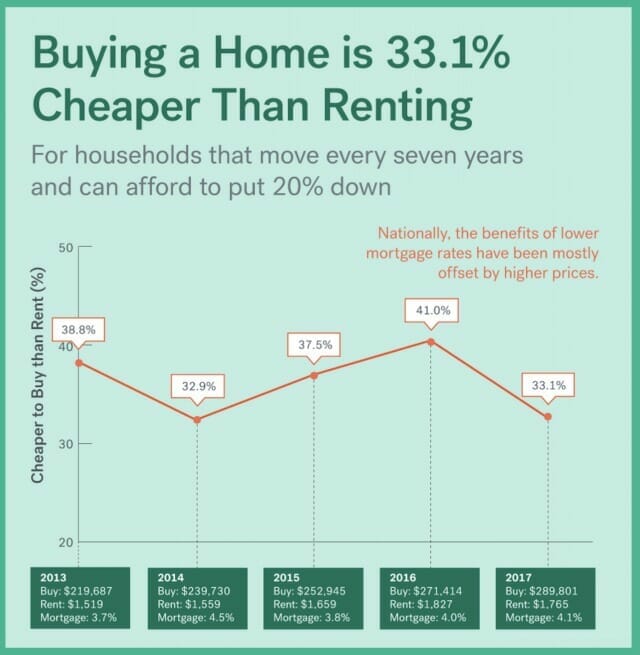
Why You Should Rent Instead of Buy
For many people, their home is their biggest investment, but is it a good investment?
A Yale economist and Nobel prize winner, Robert Shiller, did the math on homes as investments and they are not an ideal long-term investment. Housing markets don’t show great long-term returns. They barely outpace inflation.
The Washington Post looked at Shiller’s data and showed that for the last 100 years home prices have grown at a compound annual rate of 0.3% adjusted for inflation. The S&P 500 has an annual rate of return of 6.5%.
A good investment is something that puts money into your pocket. A liability is something that takes money out of your pocket. As we have already stated, even once you have paid off your mortgage, your home is still taking money out of your pocket in the form of taxes and maintenance costs. So that makes owning a home, a liability, not an investment.
The New York Times has a good rent vs. buy calculator if you want to run the numbers yourself.
Your Net Worth
Your net worth is your assets minus liabilities. If you are thinking about buying, what percentage of your net worth should a home make up?
It’s hard to get a firm grip on this number and because of this, we don’t have a firm number. As a rule of thumb, the lower the percentage of your net worth your home makes up, the better.
Diversity isn’t just important regarding your portfolio when it comes to the type of stocks and bonds you buy. You wouldn’t put 60% of your stock portfolio in one industry, would you? Your overall portfolio is no different. You don’t want such a large portion allocated to a single investment.
A study done at McGill University showed for the richest 20% of US households, the primary residence accounted for 30% of net worth. For the next 60%, the majority of households, that number was between 62-67%.
Because the numbers are so hard to determine, the rule of thumb is pretty broad. You want to keep your home in the 20-40% range as the percentage of your portfolio, but lower than that is even better.
Location Location Location
You now know how to use the price-to-rent ratio to know if it’s better to be a renter or a buyer in a given area. But there are other factors concerning location too. Is the area a one-industry town and you’re employed in that industry?
If it goes bottoms up and you’ve bought a place, you might be stuck with a house you can’t sell in a place with no job prospects. Even if you sell it eventually, it may be for less than you paid.
Is the home in a good school district? Even if you don’t plan to have kids, if you ever plan to sell your home, a good school district is important to a lot of potential buyers.
It’s Not Always About Money
We’re all about money at LMM but not every decision should be solely made based on what makes the most financial sense and it’s no different when it comes to deciding if it’s better to rent or buy. If we only looked at numbers, people would never have kids because no one ever comes out ahead on that!
There are a lot of legitimate reasons that people want to own a home; a place to put down roots, a place to raise a family, you don’t like the uncertainty of renting (an increasing problem in some cities where landlords are kicking out tenants in favor of renting on Airbnb), or because you want to put your own stamp on a place in a way that you can’t when you’re a renter.
Nothing wrong with any of those reasons. But you can’t remove the financial aspect from your decision-making completely. You can buy a home, but you don’t have to buy the most expensive and biggest you can get a loan for.
In 1973, the average household contained 3.01 people. In 2013, that number had shrunk to 2.54 people, but homes were 1000 square feet bigger! Don’t buy more house than you need. Doing so also tempts you to buy more stuff you don’t need in order to fill up all that space.
Bottom Line
Convinced yet that buying a home is a poor investment? Well, it is. UNLESS…you don’t live in the house. We have done a whole suite of both podcasts and articles on the benefits of becoming a landlord.
If you do the math, the best option is to buy a home, rent it out, and rent a place to live. Owning real estate in this way makes for an excellent passive income stream.
Show Notes
5 Year Adjustable Rate Mortgage: This is the mortgage that Andrew is leaning towards.
I Will Teach You To Be Rich: A great personal finance book.
The Simple Dollar Book: Long considered a PF classic.
Betterment: The easy way to invest.
